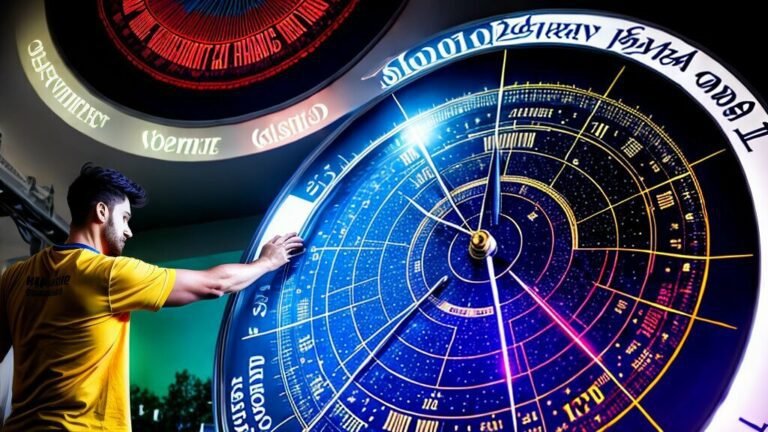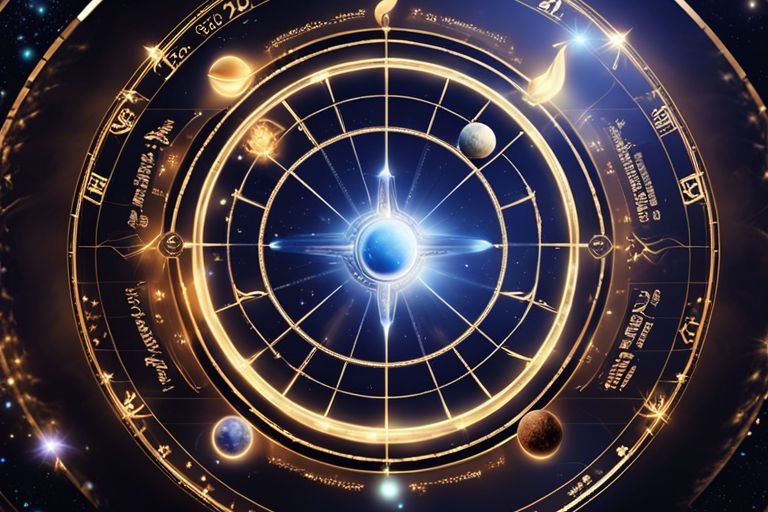How Many Types of Astrology Are There? Explore the Varieties!
If you’re interested in astrology, you may be wondering just how many types of astrology there are. The answer is: quite a lot! Astrology has a long and rich history, and over time, different cultures and traditions have developed their own unique astrological systems.
In this article, we’ll explore the various types of astrology that exist, from the traditional branches to the modern types that have gained popularity in recent years. We’ll delve deeper into Western astrology, Vedic astrology, and Chinese astrology, as well as psychic, evolutionary, and karmic astrology. We’ll also briefly mention other types of astrology that exist and how they’re used.
Key Takeaways:
- Astrology has a long and rich history with many different types of astrological systems.
- The traditional branches of astrology include Western astrology, Vedic astrology, and Chinese astrology.
- Modern types of astrology include psychological astrology, evolutionary astrology, and karmic astrology.
- Other types of astrology include horary astrology, electional astrology, and financial astrology.
- Astrological compatibility systems are also used to analyze the relationship compatibility between people.
Traditional Branches of Astrology
Astrology has been practiced for thousands of years, and there are many different types of astrology that have emerged over time. The traditional branches of astrology include Western astrology, Vedic astrology, and Chinese astrology.
Western Astrology
Western astrology is the most popular type of astrology in the Western world. It is based on the tropical zodiac, which divides the sky into twelve equal parts, each named after a constellation. Western astrology uses birth charts, also known as natal charts or horoscopes, to create a unique snapshot of the sky at the moment of a person’s birth. This chart is used to interpret the position of the planets and their relationship to each other, revealing insights about the individual’s personality, strengths, weaknesses, and potential future.
There are many different types of astrological practices within the Western tradition, including horary astrology, which answers specific questions based on the time the question is asked, and electional astrology, which helps individuals choose the best time for important events, such as weddings or business ventures.
Vedic Astrology
Vedic astrology, also known as Jyotish, is a traditional Hindu system of astrology. It is based on the sidereal zodiac, which is aligned to the position of fixed stars, rather than the tropical zodiac used in Western astrology. Vedic astrology uses birth charts to reveal insights about an individual’s past, present, and future. It also incorporates the use of planetary periods, or dashas, which indicate different stages in a person’s life and can provide guidance on how to navigate them.
Other forms of astrology within the Vedic tradition include Nadi astrology, which uses thumbprints to identify an individual’s birth chart, and Vastu Shastra, which applies astrological principles to architecture and interior design.
Chinese Astrology
Chinese astrology is based on the lunar zodiac, which assigns each year to one of twelve animal signs. These signs are believed to influence personality traits and life events. Chinese astrology also uses the five elements (wood, fire, earth, metal, and water) to further refine the interpretations of the animal signs.
Two popular forms of astrology within the Chinese tradition are BaZi, which uses an individual’s birth date and time to create a chart, and Zi Wei Dou Shu, which uses a person’s birth year, month, day, and time to reveal insights about their life path and potential.
As you can see, astrology is a rich and diverse field with many different types and systems. Whether you are interested in traditional forms of astrology or more modern approaches, there is sure to be a type of astrology that resonates with you and provides insights into your life and relationships.
Modern Types of Astrology
If you’re interested in astrology, you may have heard of some modern types that have gained popularity in recent years. These types offer unique perspectives on astrology and delve deeper into the psychological and karmic aspects of an individual’s birth chart.
Psychological astrology, for example, emphasizes the psychological components of an individual’s birth chart. By examining the placement of planets and signs in the chart, this type can offer insights into personality traits, behaviors, and desires.
Evolutionary astrology, on the other hand, focuses on the soul’s journey across multiple lifetimes. This type of astrology can help individuals understand their karmic patterns, soul growth, and life purpose.
Karmic astrology explores the influences of past lives on the current life, and can provide insights into unresolved karmic lessons and soul growth. This type of astrology can help individuals gain clarity on their life path and make positive changes.
These modern types of astrology offer valuable insights into the workings of the universe and our place within it. By exploring the various types of astrology that exist, you can gain a deeper understanding of yourself and the world around you.
Western Astrology
Western astrology, also known as tropical astrology, originates from the ancient Greeks and focuses on the study of the relationship between the positions of celestial bodies and human affairs. This system is based on the tropical zodiac, which is divided into 12 equal parts and named after constellations along the ecliptic.
Within Western astrology, there are several types of astrological practices, such as horoscopes, birth charts, and transit charts. Horoscopes are based on the position of the sun at the time of a person’s birth and provide insights into personality traits and potential life events. Birth charts, also known as natal charts, require the date, time, and location of birth, and provide a detailed analysis of planetary placements and their influences on an individual’s life. Transit charts, on the other hand, focus on the current positions of celestial bodies and how they interact with an individual’s birth chart.
Western astrology has undergone significant evolution over the centuries, with various interpretations and adaptations. However, it remains a popular and widely practiced form of astrology to this day.
Vedic Astrology
Vedic astrology, also known as Jyotish, is an ancient system of astrology that originated in India and is based on the principles of Hindu philosophy and Vedic texts. It is considered one of the oldest and most accurate forms of astrology.
There are several types of astrology systems used in Vedic astrology, such as Jaimini astrology, Nadi astrology, and Hora astrology. Jaimini astrology is focused on predictive techniques and timing of events, while Nadi astrology is used to determine the past, present, and future of an individual. Hora astrology, on the other hand, is primarily concerned with determining the best times for certain activities.
In Vedic astrology, the birth chart or horoscope is called Janam Kundli, which is used to analyze the individual’s life events, such as health, career, relationships, and finances. The chart is divided into 12 houses and nine planets, each with its own significance and influence on the individual’s life.
Vedic astrology is also closely connected to Ayurveda, the traditional Indian system of medicine, which believes that the alignment of planets can affect an individual’s health and well-being. Therefore, Vedic astrology is often used to identify health problems and recommend remedies or treatments.
Overall, Vedic astrology is a complex and comprehensive system that provides insights into every aspect of an individual’s life, from career to relationships to spirituality.
Chinese Astrology
If you’re interested in astrology, you may have heard about Chinese astrology. Chinese astrology is based on the Chinese lunar calendar and has a unique system for assigning animal signs to individuals based on their birth year. Each animal sign reflects certain personality traits and characteristics.
In addition to the zodiac signs, Chinese astrology has different types of astrology systems, such as BaZi and Zi Wei Dou Shu. BaZi astrology, also known as Four Pillars of Destiny, uses an individual’s birth date and time to analyze their destiny and provide insights into their life path, career, and relationships.
Zi Wei Dou Shu, also known as Purple Star astrology, uses an individual’s birth date and time to create a chart that can provide insights into their personality, relationships, and future events. This system is based on the position of the stars at the time of an individual’s birth.
Psychological Astrology
If you’re interested in exploring the psychological underpinnings of astrology, then psychological astrology may be right up your alley. This modern type of astrology emphasizes the psychological aspects of an individual’s birth chart, looking at how planetary placements and aspects can provide insight into personality traits, behaviors, and psychological patterns.
Through the lens of psychological astrology, you can gain a deeper understanding of your own psyche and thought processes, as well as those of others. This can be especially helpful for personal growth, relationship development, and career exploration.
“Psychological astrology is deeply focused on individual growth and development, and can help individuals gain self-awareness and insight into their own psychological makeup.”
Whether you’re new to astrology or a seasoned practitioner, psychological astrology offers a unique and nuanced approach to understanding the human psyche through the lens of the stars.
Evolutionary Astrology
If you’re interested in exploring the deeper purpose of your life, you might find evolutionary astrology to be a helpful tool. This modern type of astrology focuses on your soul’s journey across multiple lifetimes and aims to provide insights into your current life purpose and karmic patterns.
Evolutionary astrology is based on the idea that your birth chart represents the evolutionary path your soul is on and the lessons it needs to learn in this lifetime. Unlike traditional astrology, which mainly focuses on the personality traits and characteristics of an individual, evolutionary astrology looks beyond the surface level and delves into the deeper spiritual aspects of your being.
Karmic Astrology in Evolutionary Astrology
One of the main tenets of evolutionary astrology is the understanding of karma and how it relates to your current life experiences. According to this philosophy, your birth chart represents the accumulated karma from previous lifetimes that you need to resolve in this lifetime.
By examining the position of certain planets and their aspects in your birth chart, evolutionary astrologers can identify the karmic lessons you need to learn and the patterns that may be holding you back from spiritual growth. This can provide valuable insights into your life purpose and help you overcome any blockages that may be preventing you from achieving your full potential.
If you feel stuck or unsure about your life direction, evolutionary astrology may be able to provide you with the guidance and clarity you need to move forward on your soul’s journey.
Karmic Astrology
Karmic astrology is a modern type of astrology that explores the concept of karma and how it affects individuals in their current life. This type of astrology believes that our past lives have an impact on our current life, and that unresolved karmic lessons may manifest as challenging experiences or patterns that we encounter repeatedly.
Karmic astrology delves deeper into an individual’s birth chart to identify specific karmic influences and lessons that need to be addressed. It also offers insights into the potential for soul growth and spiritual evolution in this lifetime.
Some of the key elements that karmic astrology examines in a person’s birth chart include the North and South Nodes, the position of Saturn, and any repeating patterns or themes in the chart. The North and South Nodes represent the karmic path that an individual is meant to follow in this lifetime, while Saturn’s placement indicates the areas where karmic lessons need to be learned.
Karmic astrology can help you gain a deeper understanding of your life’s purpose and potential, as well as provide guidance for overcoming challenges and obstacles based on past-life influences. By identifying and addressing unresolved karmic lessons, you can move towards a path of healing and growth.
Other Types of Astrology
Aside from the traditional and modern branches of astrology, there are other types of astrology that exist. These less well-known astrology systems have their unique focuses and applications.
Horary Astrology
Horary astrology is a type of astrology that answers specific questions posed by an individual. It is a divinatory system that uses the time and location of the question to cast a chart and provide answers.
Electional Astrology
Electional astrology is a type of astrology used to find the most favorable times for important events such as weddings, business openings, and even surgery. It looks at the planetary alignments and cycles to determine the best time to initiate an event.
Financial Astrology
Financial astrology is a type of astrology that focuses on financial markets and investments. It uses the planetary cycles and alignments to analyze and predict market trends and fluctuations.
While not as well-known as some of the other types of astrology, horary, electional, and financial astrology can still offer valuable insights and guidance in their respective areas.
Astrological Compatibility Systems
Are you curious about the compatibility between you and your partner, or between two friends? Astrological compatibility systems are a type of astrology that examines the similarities and differences between two individuals’ birth charts to determine how well they might get along.
The two most popular astrological compatibility systems are Synastry and Composite charts. Synastry compares the planets and aspects in each person’s birth chart to see how they interact with each other, while Composite charts create a third chart that represents the relationship itself.
| Synastry | Composite Charts |
|---|---|
| In Synastry, each person’s birth chart is compared to the other person’s chart to see how their planets and aspects interconnect. | In Composite charts, a new chart is created that represents the relationship between two people, using the midpoints of each person’s planets. |
| It can reveal important areas of compatibility and incompatibility, such as areas where one person’s strengths balance out the other person’s weaknesses, or where their personalities clash. | It can reveal the purpose and dynamics of the relationship itself, such as how the couple sees themselves and each other, and what the relationship represents. |
| It is useful for romantic relationships, friendships, and business partnerships. | It is primarily used for romantic relationships. |
Overall, astrological compatibility systems can provide valuable insights into the dynamics and potential challenges of relationships, helping individuals navigate them with greater understanding and compassion.
Conclusion
Congratulations! You have now been introduced to the many different types and systems of astrology. From Western astrology to Vedic astrology, from psychological astrology to karmic astrology, and even astrological compatibility systems, there is a wide range of options to explore.
Remember, astrology is a rich and diverse field with a long history, and each type or system has its unique wisdom and insights to offer. Whether you are seeking guidance on your life purpose, deeper self-understanding, or insights into your relationships, there is an astrology type or system that may suit your needs.
So, go ahead and explore the fascinating world of astrology. Who knows, you may discover something new about yourself and the world around you.
FAQ
Q: How many types of astrology are there?
A: There are various types of astrology, each with its own unique practices and traditions.
Q: What are the traditional branches of astrology?
A: The traditional branches of astrology include Western astrology, Vedic astrology, and Chinese astrology.
Q: What are the modern types of astrology?
A: Some popular modern types of astrology are psychological astrology, evolutionary astrology, and karmic astrology.
Q: What is Western astrology?
A: Western astrology is a system that originated in the West and includes practices such as horoscopes and birth charts.
Q: What is Vedic astrology?
A: Vedic astrology is an ancient Indian system based on scriptures and includes astrology systems like Jyotish and Nadi astrology.
Q: What is Chinese astrology?
A: Chinese astrology is closely tied to the Chinese zodiac and utilizes systems like BaZi and Zi Wei Dou Shu.
Q: What is psychological astrology?
A: Psychological astrology focuses on the psychological aspects of an individual’s birth chart to provide insights into personality traits and behaviors.
Q: What is evolutionary astrology?
A: Evolutionary astrology explores the soul’s evolution across lifetimes and helps individuals understand their karmic patterns and life purpose.
Q: What is karmic astrology?
A: Karmic astrology examines the influences of past lives on the current life and provides insights into unresolved karmic lessons and soul growth.
Q: Are there any other types of astrology?
A: Yes, there are other types of astrology, such as Horary astrology, Electional astrology, and Financial astrology, each with its own unique focuses and applications.
Q: What are astrological compatibility systems?
A: Astrological compatibility systems, such as Synastry and Composite charts, are used to analyze the compatibility between individuals in relationships.






